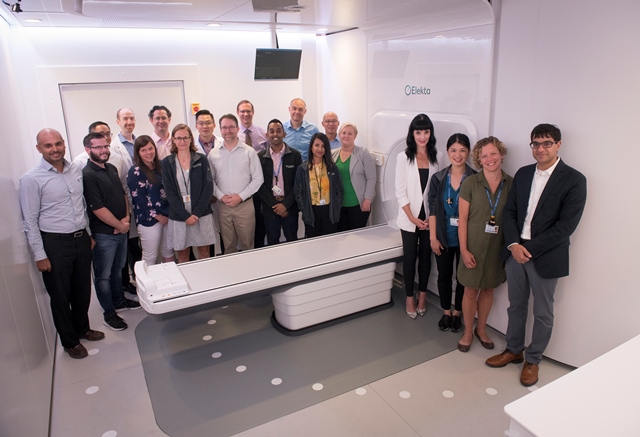By Alexis Dobranowski
On August 15, members of Sunnybrook Health Sciences Centre’s radiation team treated the first patient in Canada on the new MR-Linac — the Elekta Unity.
This technology is the first machine in the world to combine radiation and high-resolution magnetic resonance imaging (MRI), and will let the team at the Odette Cancer Centre target tumours and monitor their response to radiation with unprecedented precision — even as a tumour moves inside the body — thanks to the machine’s real-time MRI guidance.
The team watched on MRI as a beam of radiation hit a glioblastoma. Seeing the radiation hit the target means the team can ensure exceptional precision, spare healthy tissue, and adjust the radiation target if needed.
As a founding member of the Elekta MR-Linac consortium and the first Canadian centre to install an MR-Linac, Sunnybrook’s team made significant contributions to the development and implementation of this technology, beginning with an imaging research study and now embarking on a clinical trial called MOMENTUM (The Multiple Outcome Evaluation of Radiotherapy Using the MR-Linac).
“We are so excited that our efforts can now benefit patients,” said Dr. Arjun Sahgal, radiation oncologist and head of Odette Cancer Centre’s Cancer Ablation Therapy Program. “The Elekta Unity will help us target tumours more precisely, sparing the healthy surrounding tissue. ”
Sunnybrook is one of seven centres participating in the MOMENTUM study, the next phase in the clinical implementation of the MR-Linac. The data collected through MOMENTUM will help inform future novel treatment approaches on the machine.
Images will be taken on each day of a patient’s treatment, and radiation delivery will be adapted based on the image to target the tumour, even as the tumour moves inside the body. This optimal radiation treatment approach aims to improve patients’ survival while also reducing damage to the surrounding healthy tissue.
Patients enrolled in MOMENTUM will be asked if they are willing to share their de-identified information about their treatment experience, including their MR images and quality-of-life information.
At Sunnybrook, the team of radiation oncologists will identify patients to be treated on the MR-Linac, based on indications that they believe are well-suited for this technology. At Sunnybrook, MOMENTUM will focus initially on glioblastoma and prostate cancer, followed by pancreatic, head and neck, and cervical cancers. Additional cancer sites will be rolled out in a controlled and systematic way, to ensure we are delivering safe, effective treatments on this new device.
The implementation of the MR-Linac technology and start of the MOMENTUM at Sunnybrook has been made possible by a large team of dedicated staff, including radiation oncologists, medical physicists, radiation therapists, researchers, MRI scientists and more.
“Through MOMENTUM, we will collect and contribute to data that will help researchers and oncologists here and around the world come up with the best ways of ablating tumours using this technology,” said Dr. Sahgal. “This kind of work is so important for improving patient outcomes and experience.”




